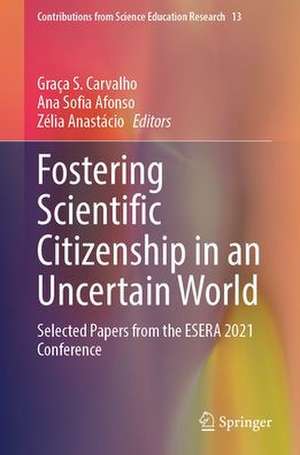Fostering Scientific Citizenship in an Uncertain World: Selected Papers from the ESERA 2021 Conference: Contributions from Science Education Research, cartea 13
Editat de Graça S. Carvalho, Ana Sofia Afonso, Zélia Anastácioen Limba Engleză Hardback – 19 iul 2023
Preț: 952.72 lei
Preț vechi: 1161.85 lei
-18% Nou
Puncte Express: 1429
Preț estimativ în valută:
182.36€ • 198.15$ • 153.28£
182.36€ • 198.15$ • 153.28£
Carte tipărită la comandă
Livrare economică 21 aprilie-05 mai
Preluare comenzi: 021 569.72.76
Specificații
ISBN-13: 9783031322242
ISBN-10: 303132224X
Pagini: 324
Ilustrații: XIII, 324 p. 1 illus.
Dimensiuni: 155 x 235 mm
Greutate: 0.65 kg
Ediția:1st ed. 2023
Editura: Springer International Publishing
Colecția Springer
Seria Contributions from Science Education Research
Locul publicării:Cham, Switzerland
ISBN-10: 303132224X
Pagini: 324
Ilustrații: XIII, 324 p. 1 illus.
Dimensiuni: 155 x 235 mm
Greutate: 0.65 kg
Ediția:1st ed. 2023
Editura: Springer International Publishing
Colecția Springer
Seria Contributions from Science Education Research
Locul publicării:Cham, Switzerland
Cuprins
Chapter1. Unpredictability and Uncertainty ... How can science education inspire young people to act for citizenship.- Chapter2. Learning and becoming in movement – a conceptual lens to research in science education, committed to fostering scientific citizenship in an uncertain world.- Chapter3. Looking toward the future: learning from investigations with newly hired science teachers.- Chapter4. Teaching nature of science through stories based on the history of the balance of nature idea: insights from the first cycle of a developmental study.- Chapter5. A Content Analysis of the Representation of The Nature of Science in A Turkish Science Textbook.- Chapter6. Structure and measurement of system competence – promoting systems thinking using analogue and digital models.- Chapter7. Identifying performance levels of enacted pedagogical content knowledge in pre-service biology teachers' lesson plans.- Chapter8. Oh, no - that’s Disgusting! Influence of disgust and different teaching methods on students’ State of Interest.- Chapter9. How suitable are explanation videos for the chemistry classroom? - analysing and evaluating an explanation video on metal bonding.- Chapter10. Context-based learning as a method for differentiated instruction in chemistry education.- Chapter11. Using fiction in physics’ laboratories to engage undergrad students.- Chapter12. Inquiry and argumentation practices enacted by early students in an inquiry cycle about gravity and air friction.- Chapter13. An approach to generating guidelines for designing scientific argumentation competence assessments.- Chapter14. Teachers’ use of explicit instruction when planning lessons to foster students’ scientific inquiry competencies.- Chapter15. Irish primary teachers’ perspectives on the challenges and positives of teaching science during the covid-19 crisis.- Chapter16. Virus-related knowledge in pandemic times – results from two cross-sectional studies in austria and implications for secondary education.- Chapter17. Inoculating adolescents against climate change misinformation.- Chapter 18. Two-eyed seeing and scientific holism in a new science|environment|health pedagogy.- Chapter 19. Coming together across differences: the uniting role of social justice in science education.
Notă biografică
Graça S. Carvalho is a Full Professor at Minho University, Portugal. She has a MSc degree in Biology (Cambridge University, UK) and a MSc in Health Education and Health Promotion (King's College London, UK), a PhD degree in Biology (Aveiro University, Portugal) and the Aggregation title in the Health Education field (Minho University). She is a Research Centre on Child Studies (CIEC) member. She was awarded the honorary degree of "Doctor Honoris Causa" (Lyon University, France) in 2017, and the "Women in Science" award (Portuguese "Ciência Viva") in 2019.
Ana Sofia Afonso (PhD Reading, UK, 2005) is an Assistant Professor in Science Education and researcher at the Research Centre on Education, UMinho, Portugal. Her research lies primarily in the area of informal science education. She is also interested in science teacher development.
Zélia Anastácio (PhD, 2007) is an Assistant Professor at the University of Minho. She teaches Human Biology and Health, Natural Sciences I, and Research Methods. She got her PhD (co-tutorship) in Child Studies (Minho University, Portugal) and Didactics of Biology, Health and Environment (Lyon University, France). She is a Research Centre on Child Studies (CIEC) member and researches biology education, health promotion and education, and sexuality education.
Ana Sofia Afonso (PhD Reading, UK, 2005) is an Assistant Professor in Science Education and researcher at the Research Centre on Education, UMinho, Portugal. Her research lies primarily in the area of informal science education. She is also interested in science teacher development.
Zélia Anastácio (PhD, 2007) is an Assistant Professor at the University of Minho. She teaches Human Biology and Health, Natural Sciences I, and Research Methods. She got her PhD (co-tutorship) in Child Studies (Minho University, Portugal) and Didactics of Biology, Health and Environment (Lyon University, France). She is a Research Centre on Child Studies (CIEC) member and researches biology education, health promotion and education, and sexuality education.
Textul de pe ultima copertă
This edited volume brings together innovative research in the field of Science Education, fostering scientific citizenship in an uncertain world. The nineteen chapters presented in this book address diverse topics, and research approaches carried out in various contexts and settings worldwide, contributing to improving and updating knowledge on science education. The book consists of selected high-quality studies presented at the 14th European Science Education Research Association (ESERA) Conference, held online (due to the Covid-19 pandemic) by the University of Minho, Portugal, between August 30th and September 3rd, 2021. Being of great relevance in contemporary science education, this book stimulates reflection on different approaches to enhance a deeper understanding of how better prepare the coming generations, which is of great interest to science education researchers and science teachers.
Caracteristici
Includes a diversity of international studies with original, innovative and rigorous methodologies Combines high-quality papers from ESERA 2021 conference, which attracted contributions from all continents Offers new insights from various perspectives fostering scientific citizenship












